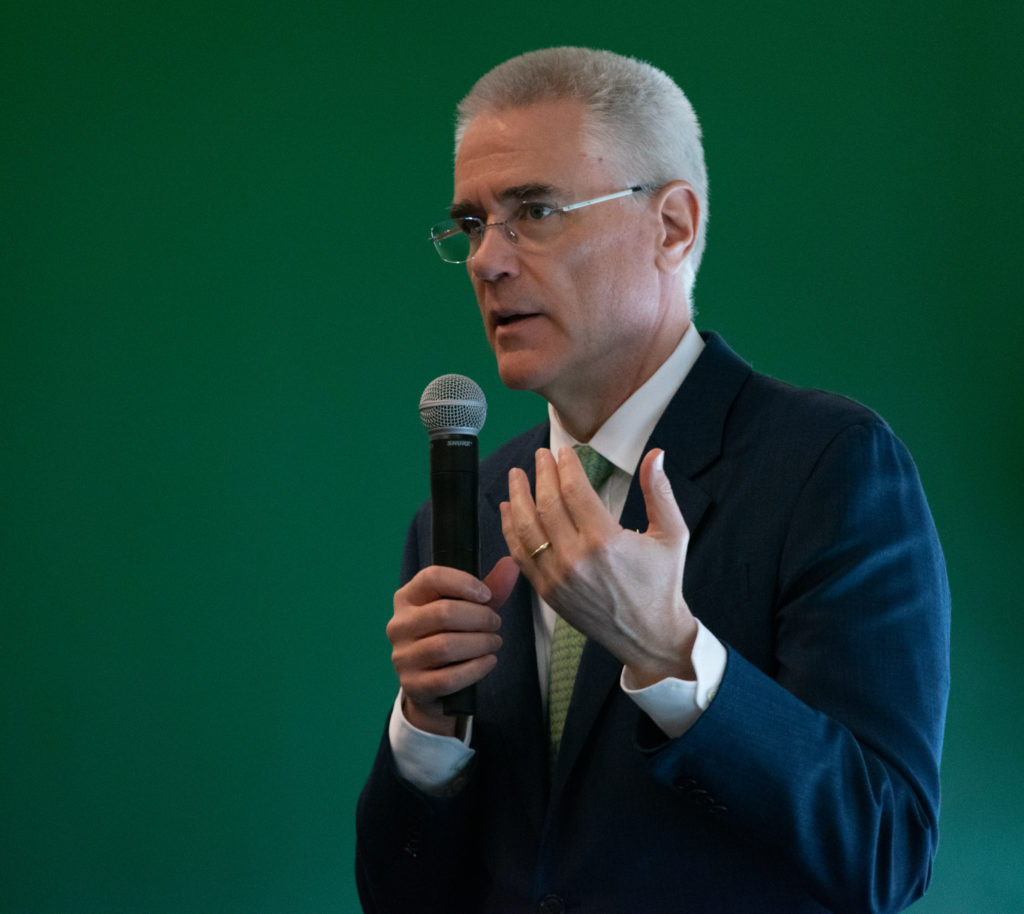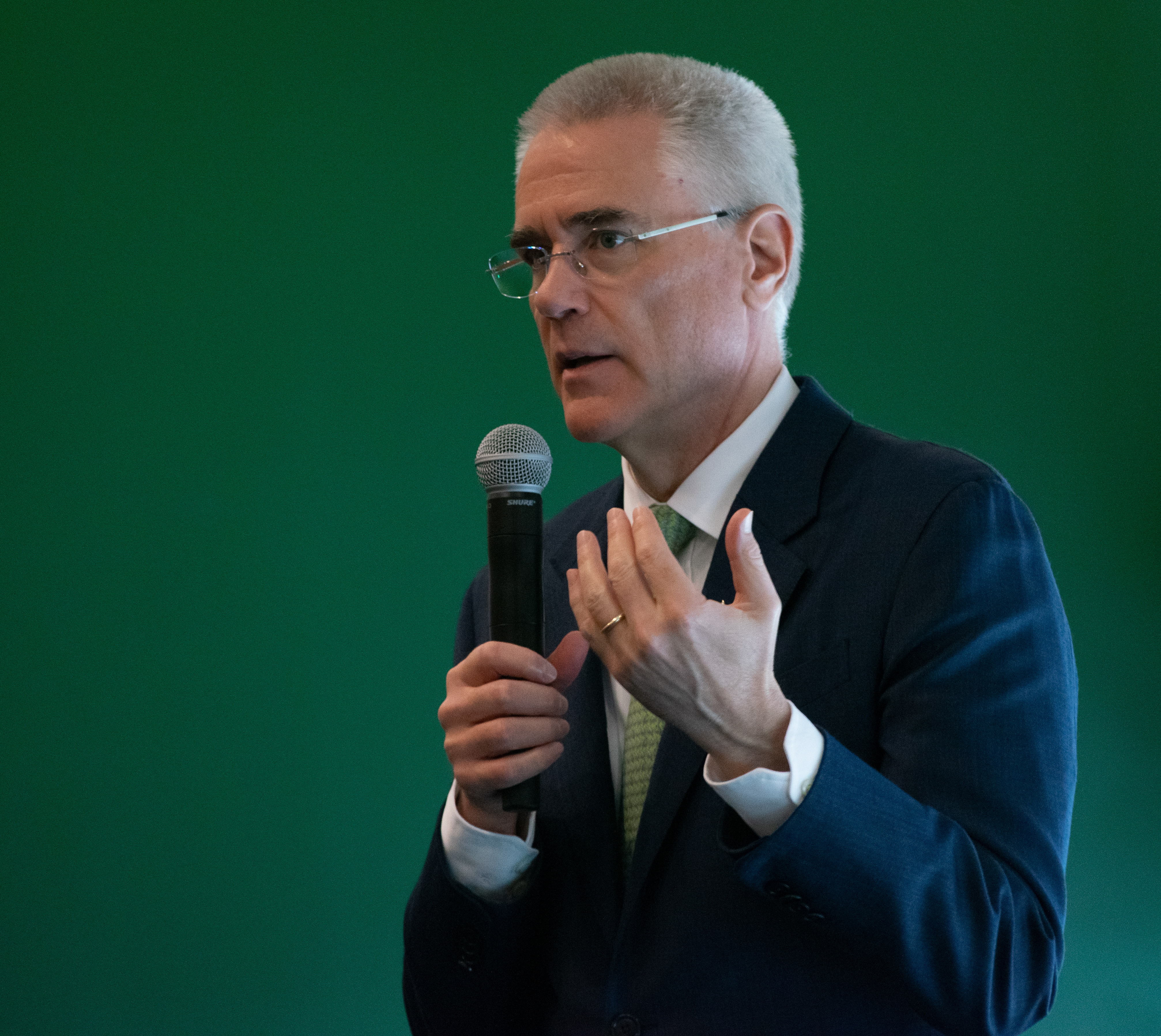In St. Petersburg, the proposal landed with a thud.

assure the St. Petersburg campus and its allies in the Pinellas business and political
communities that the campus will prosper under consolidation.
Jonah Hinebaugh | The Crow’s Nest
By Nancy McCann
New President Steve Currall unveiled a sweeping proposal for consolidating the USF system’s three campuses this week with soaring language and unbounded optimism.
But in St. Petersburg, his proposal landed with a thud.
From the president of the Faculty Senate to the Student Government president and several campus administrators, the reaction ranged from concern to alarm and outrage.
At a meeting of Regional Chancellor Martin Tadlock’s administrators and key advisers on Wednesday, the dean of the College of Arts and Sciences seized on Currall’s plan to wrest control of academics and student affairs from Tadlock and transfer that to Tampa.
“There are no academic affairs on this campus (in Currall’s plan),” said Dean Magali Michael. “People aren’t comfortable with that.”
Michael also said that “people (on the St. Petersburg campus) feel like they don’t have a voice even when they have participated in many series of committees and meetings with an open mind. Many people have felt like they were not heard, and their proposals were swept aside.”
SG President Jadzia “Jazzy” Duarte warned that many newer students are unaware that some of the distinctive features that drew them to the St. Petersburg campus may be in jeopardy.
One of them is Student Government. Currall’s plan calls for one Student Government, not three.
“I chose this campus for a reason, for the benefits of a small campus,” Duarte said. “We have our own identity here and I’ve been fighting to keep it.”
Meanwhile, the most forceful initial reaction came from history professor Ray Arsenault, who as president of the St. Petersburg Faculty Senate has been outspoken at every stage of the consolidation process.
Consolidation was initiated by Florida legislators in 2018 with the goal of spreading USF Tampa’s designation as a preeminent state research university to the St. Petersburg and Sarasota-Manatee campuses, Arsenault said.
But the implementation of consolidation “has been hijacked as a power shift of cultural and social capital,” he said.
This is “the darkest moment in the history of the (St. Petersburg) campus,” Arsenault said.
When he was named USF system president, Currall inherited the hot potato of consolidation from his predecessor, longtime President Judy Genshaft.
Since taking office on July 1, Currall has taken pains to assure the St. Petersburg campus and its allies in the Pinellas business and political communities that the campus will prosper under consolidation.
When he met with editorial writers and reporters at the Tampa Bay Times last month, Currall said he has heard fears that St. Petersburg will lose its autonomy and identity, with many of its resources moving to Tampa.
That will not happen, he said.
“Those fears are not well-founded,” he told the Times. “I think a lot of that is just worrying.”
Yet the “preliminary blueprint” for consolidation that he unveiled to the USF System Board of Trustees on Sept. 10 sounded a lot like the documents and talking points that came from the Genshaft administration in the last months of her 19-year tenure.
Currall used words like “preeminence” and “world-class university.” He stressed the benefits that students and faculty on all three campuses would enjoy under consolidation and suggested that St. Petersburg would get several new “centers of excellence.”
But he also would take control of academic and student affairs from Tadlock and Sarasota-Manatee Chancellor Karen Holbrook and move them to Tampa.
In an interview with The Crow’s Nest, Tadlock said that 75 to 80 percent of what he controls now in people, money and resources would go to USF system Provost Ralph Wilcox in Tampa.
That appears to conflict with language enacted into law by the Florida Legislature in June that says both St. Petersburg and Sarasota-Manatee must become full branch campuses once consolidation takes effect next July.
Under that law, USF must follow the language of its regional accrediting agency, which in defining full branch campuses stipulates that those campuses must have the authority to shape their budgets, hire faculty and tailor programs for their students.
Arsenault, the Faculty Senate president, said the Currall plan is “in defiance” of the Legislature.
“The way consolidation is going for us is a disaster and removes all academic decision-making over here,” he said.
“It turns Martin (Tadlock) into a glorified development officer and gives him no academic authority.”
Outwardly at least, Tadlock appeared unruffled by the controversy and the prospect of losing much of his authority.
Like Currall, Tadlock stressed that Currall’s plan is preliminary and likely to change as administrators and faculty on the three campuses continue their deliberations.
“We are together on this,” he told his administrators and key advisers Wednesday. “We will support each other on this. It’s going to be OK.”



